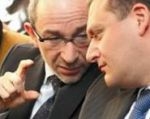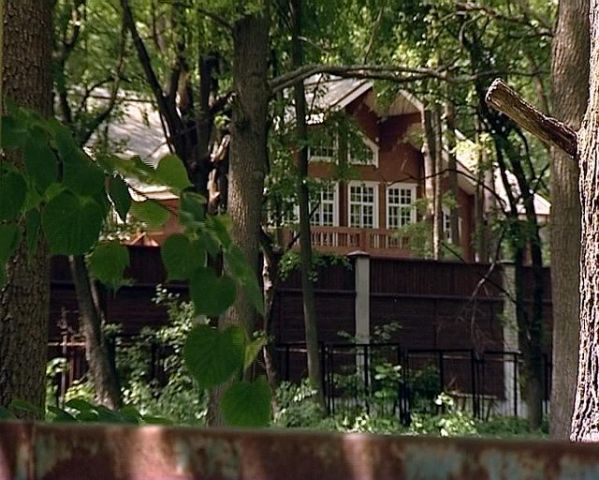PublicOfficials’ Income Declarations turned into Farce

Gennady Kernes (in glasses) and Mykailo Dobkin
The Law on Access to Public Information obliges officials to report their income. Marina Nikolayeva decided to check out the value of such documents through the example of the Governor of the Kharkiv Region, Mykhailo Dobkin and Mayor of Kharkiv, Gennady Kernes.
As reported, the Public Information Act which came into force on 9 May 2011 contains a list of officials who are obliged to fill out income declarations.
Many such officials were eager to express their willingness at any time to provide the said declarations. Kharkiv’s Governor and Mayor are both rather controversial figures. Kernes in particular has received a great deal of publicity over the removal from air of three TV channels – ATN, A/TVK and Fora - known to have angered him on many occasions for their critical reports of the authorities’ actions. Kernes, who denies any involvement in the termination of broadcasting, also has a strong business interest, being a major shareholder in another television channel. Representatives of Ukrainian media groups, OSCE and other international bodies, and human rights groups have expressed strong concern over the developments.
Both Dobkin and Kernes have been entirely forthcoming with their declarations.
Marina Nikolayeva writes that Kernes would seem in need of material assistance.
“It is no secret for any Kharkiv resident that Gennady Kernes is the owner of hotels, television shares and luxury cars. Only his declaration asserts that all of this wealth is a mirage. On paper the City Mayor is registered in a private home virtually on the outskirts of the city” The area, she says, is certainly not the cheapest, with its elite cottages among pines and the river nearby. It was this district – Bolshaya Danilova – that first gave Kernes the votes to get on the City Council.
“However my mind refuses to believe that the head of the city lives in a small singe-storey house and travels to work each day on a terrible road. Yet one has to believe it since it is precisely this address that is given in his income declaration for 2010. According to the document, the City Mayor has no land, nor homes, nor a flat, nor a dacha, and doesn’t even have a garage.
The Mayor’s pay as per the declaration is less than 10 thousand UAH a month [less than 1, 000 EUR] – how could he not ask for financial assistance from the city budget – that’s another 22.5 thousand UAH. He has 114 thousand UAH in his bank accounts. Admittedly there isn’t a specially place on the declaration for an explanation of where, with such poverty, his 19-year-old son Rodion Kernes could have a BMW X6 worth no less than 100 thousand USD. Which the young man does not exactly treat this expensive toy with great care, driving it at 260 kilometres an hour.”
The Mayor, who is rumoured to possess a whole range of elite cars, has declared a mere two – a Porsche 911 Carrera and Mercedes-Benz s 550 – together worth 250 thousand USD.
The author writes that the cars are mostly kept at the National Hotel where the Mayor apparently lives. It is also believed that he actually owns the hotel.
The cars are only not seen, according to one of the residents, on the street where, according to his declaration, he lives. The neighbour says that the people living in the house are retired teachers who were at some stage acquainted with Kernes.
The situation is similar with the region’s Governor, Mykailo Dobkin, although the rumours that it is his niece who lives at the address given on his declaration would seem borne out by the fact that the area around the house is always in good repair and clean.
It is unclear where the Governor does in fact live. Certainly the mansion inside the Lesopark – forest park area on the edge of Kharkiv, and the elite flat in the centre simply don’t exist according to Dobkin’s declaration. According to the environmental group Zeleny Front, during the time that Dobkin and Kernes have been in office, they have given away more than one thousand hectares or ¾ of the Lesopark land.
The mansion is hidden from Kharkiv residents’ eyes by a huge fence.
The author writes that despite their modest family budget, officials spend part of their income on charity. And they do this with style, buying pictures worth a quarter, half or even more of their annual income (as per declaration, of course).
Purchases from a charity auction, for example, supposedly cost Dobkin at least half his yearly – declared – income. For Kernes the two pictures he declared the intention of buying, the amount would have been a third of his declared yearly income.
The author notes that none of the figures add up, but neither Dobkin nor Kernes are willing to explain where they get their money, including that which Dobkin’s wife used to buy a share of the television company Tonis Centre from the former Governor, Arsen Avakov. Part of this same company belongs to Kernes. Dobkin informs only that the purchase will be put in next year’s declaration.
“The fact that officials have written false information in their declarations is not doubted by people on the street, or politicians, or lawyers. Whether this is because they don’t want to stand out and irritate their electorate, or through unlimited arrogance and contempt for the law – there opinions are divided.”
The author notes that the same situation is seen with members of the Cabinet of Ministers. Despite the fact that some of them are millionaires, their declarations would suggest that they too could do with financial assistance. .
According to legal expert Vasyl Bilous, one of the problems is that there is virtually no way of forcing officials to declare their income truthfully and pay tax on it. The only mechanisms are some purely symbolic fines from the tax departments, and that assumes that the relevant tax officials themselves find out since representatives of the regional department of the civil service are not obliged to inform them.
He says that ordinary members of the public can approach the law enforcement bodies, however there is no guarantee that this will lead to an investigation.
The original article which this summarizes was produced as part of a project supporting investigative journalism carried out by the Kharkiv Human Rights Group with the financial support of the International Renaissance Foundation
Dobkin’s "modest abode"






